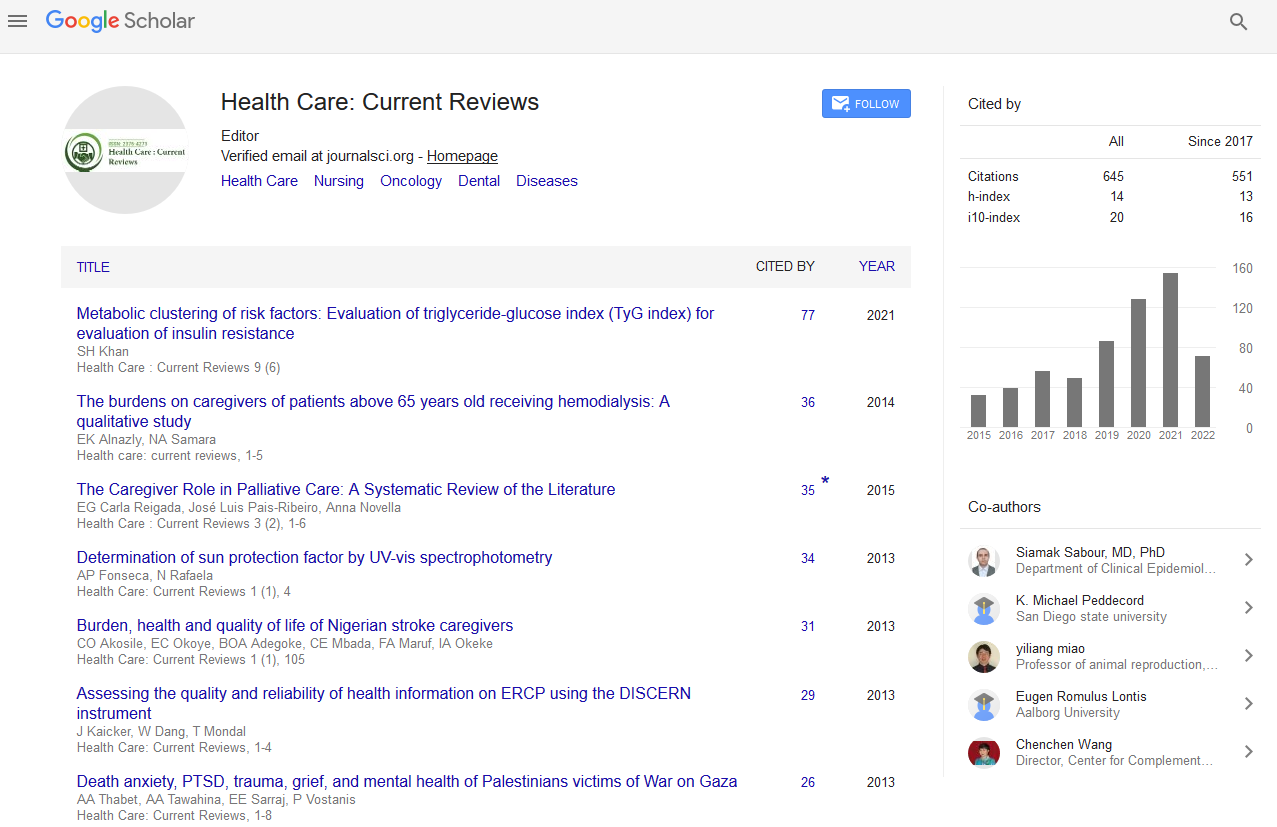PMC/PubMed Indexed Articles
Indexed In
- Open J Gate
- Academic Keys
- RefSeek
- Hamdard University
- EBSCO A-Z
- Publons
- Geneva Foundation for Medical Education and Research
- Google Scholar
Useful Links
Share This Page
Journal Flyer

Open Access Journals
- Agri and Aquaculture
- Biochemistry
- Bioinformatics & Systems Biology
- Business & Management
- Chemistry
- Clinical Sciences
- Engineering
- Food & Nutrition
- General Science
- Genetics & Molecular Biology
- Immunology & Microbiology
- Medical Sciences
- Neuroscience & Psychology
- Nursing & Health Care
- Pharmaceutical Sciences
Short Communication - (2020) Volume 0, Issue 0
COVID-19: Impact on Health Care
Rekha M*Received: 01-Sep-2020 Published: 21-Sep-2020, DOI: 10.35248/2375-4273.20.S1.263
Abstract
Since the start of the outbreak, health care providers are shown more support, solidarity and gratitude than they ever have. Yet, attacks on health care have continuously been reported and now also include incidents linked to the COVID-19 pandemic across the planet.
Keywords
Coronavirus
Introduction
The This unprecedented public health emergency has demonstrated that health facilities, medical transport, patients also as health care workers and their families can – and do – become targets everywhere. This alarming trend reinforces the necessity for improved measures to guard health care from acts of violence. During the COVID-19 pandemic quite ever, protecting the health and lives of health care providers on the frontline is critical to enabling a far better global response.
Ensuring access to health services is that the cornerstone of a successful health response. Any verbal or physical act of violence, obstruction or threat that interferes with the supply, access and delivery of such services is defined as attack on health care by the planet Health Organization (WHO).
Impact on the Response
The COVID-19 pandemic has put some health systems under immense pressure and stretched others beyond their capacity. As such, responding to the present public health emergency and successfully minimizing its impact requires every health resource to be leveraged. Failure to guard health care during this rapidly changing context exposes health systems to critical gaps in services once they are most needed, and may have a long-lasting impact on the health and wellbeing of populations.
In fragile and conflict-affected countries, acts of violence during the COVID-19 pandemic have already deprived many medical services and severely hindered the response. Among others, the bombardment and destruction of a 400-bed facility in Libya further reduced the power of health authorities and aid agencies to organize for a full-blown epidemic.
In other countries where attacks on health care are noticed, the COVID-19 pandemic has sometimes created hostile environments for health care providers who have reported incidents of violence, discrimination and harassment. Stigmatized as vectors of contagion in many countries, some are assaulted, others were denied transport while commuting to figure, and full families were evicted from their homes. Furthermore, reports of attacks on medical vehicles carrying COVID-19 samples, on-duty COVID-19 drivers also as patients are accumulating and raising concerns worldwide.
However, attacks on health care not only have an immediate impact on the power of health systems to deliver services to those most in need, but also take an important toll on the psychosocial health of patients, critical health care providers on the frontline and their families. As those still be targeted by acts of violence during these public health emergency, health systems must – among other things – steel oneself against shortages of health care workers unwilling or unable to report back to work thanks to unsafe environments or obstruction in their personal lives.
These attacks on health care speak to the importance of adequate risk communication in the least levels of society to scale back fear, stigma and – ultimately – violence. How we communicate about COVID-19 is critical in supporting people to require effective action to combat the disease and protect health care.
Responding to Attacks
During the pandemic, the international community, governments and civil society have taken the primary steps to guard health systems by addressing attacks on health care also as their roots.
To stop attacks on vital infrastructure like health facilities and water and sanitation systems, the international community has involved ceasefires in conflict-affected areas. Some national and native governments introduced new policies to guard health care, including in India where perpetrators are punishable with prison terms up to 7 years. In Mexico, some cities have implemented dedicated transport services for health care workers after many were refused entry on public buses.
WHO, governments and therefore the international community have also taken measures to deal with stigma around COVID-19. Additionally to regular social media campaigns, the govt of the UK and WHO launched the collaborative campaign ‘Stop the Spread’ to boost awareness about the risks of misinformation across Africa, Asia, Europe, the centre East and Latin America.
WHO continues to gather information and data to enhance our understanding of COVID-19 related attacks, inform its network of partners and document good practices.
Citation: Rekha M (2020) COVID-19: Impact on Health Care. Health Care: Current Reviews S1:263. doi: 10.35248/2375-4273.20.S1.263.
Copyright: © 2020 Rekha M. This is an open-access article distributed under the terms of the Creative Commons Attribution License, which permits unrestricted use, distribution, and reproduction in any medium, provided the original author and source are credited.


